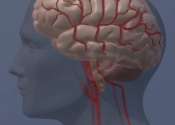Study reveals how the brain tracks objects in motion
Catching a bouncing ball or hitting a ball with a racket requires estimating when the ball will arrive. Neuroscientists have long thought that the brain does this by calculating the speed of the moving object. However, a ...
Mar 6, 2018
0
69







